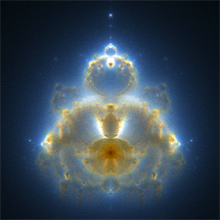Brahman
Appearance

Brahman (Sanskrit: ब्रह्मन् brahman), in Hinduism, designates the Ultimate Reality, "the unchanging reality amidst and beyond the world", which "cannot be exactly defined", but is evoked in all forms of Sat-cit-ānanda (being-consciousness-bliss). Brahman can be conceptualized as personal (Saguna Brahman, with qualities), impersonal (Nirguna Brahman, without qualities) and Supreme (Para Brahman, the Highest Brahman) with varying emphasis in various philosophical schools. In some monistic traditions it is referred to as the Divine Ground of all Being, and compared to notions of Tao, God, Godhead, and the All in other mystical traditions.


Quotes from Hindu sacred texts
[edit]- Great indeed are the devas who have sprung out of Brahman.
- Atharva Veda, as quoted in Encyclopaedia of Indian Philosophy (2007) edited by Vraj Kumar Pandey, Volume 2
- The act of offering is Brahman; that which is offered is Brahman; the sacred fire is Brahman; the one who makes the offering is Brahman; Brahman is thus attained by those who, in their actions, are absorbed in contemplation of Brahman.
- Bhagavad Gita 4.24
- Similar to a person who is not attached to external pleasures but enjoys happiness in the Atman (soul), the person who perceives Brahman in everything feels everlasting joy.
- Bhagavad Gita, 5.21
- Om — That (supreme Brahman) is infinite, and this (conditioned Brahman) is infinite. The infinite (conditioned Brahman) proceeds from infinite (supreme Brahman). Then through knowledge, taking the infinite of the infinite (conditioned Brahman), it remains as the infinite (unconditioned Brahman) alone. Om! Peace! Peace! Peace!
- Isha Upanishad as translated by Swami Gambhirananda (1965)
- That which is not uttered by speech, that by which the word is expressed, know That alone to be Brahman, and not this (non-Brahman) which is being worshipped. That which one does not think with the mind, that by which, they say, the mind is thought, know That alone to be Brahman, and not this (non-Brahman) which is being worshipped. That which man does not see with the eye, that by which man sees the activities of the eye, know That alone to be Brahman, and not this (non-Brahman) which is being worshipped. That which man does not hear with the ear, that by which man hears the ear’s hearing, know That alone to be Brahman, and not this (non-Brahman) which is being worshipped. That which man does not smell with the organ of smell, that by which the organ of smell is attracted towards its objects, know That alone to be Brahman, and not this (non-Brahman) which is being worshipped.
- Kena Upanishad, as translated in Upanishads : In Sankara's Own Words (1991) translated by V. Panoli
- Because of My affection for Thee I shall speak to Thee of that Supreme Brahman, Who is ever Existent, Intelligent, and Who is dearer to Me than life itself. O Maheshvari! the eternal, intelligent, infinite Brahman may be known in Its real Self or by Its external signs. That Which is changeless, existent only, and beyond both mind and speech, Which shines as the Truth amidst the illusion of the three worlds, is the Brahman according to Its real nature. That Brahman is known in samadhi-yoga by those who look upon all things alike, who are above all contraries, devoid of doubt, free of all illusion regarding body and soul. That same Brahman is known from His external signs, from Whom the whole universe has sprung, in Whom when so sprung It exists, and into Whom all things return. That which is known by intuition may also be perceived from these external signs. For those who would know Him through these external signs, for them sadhana is enjoined.
- Mahanirvana Tantra : Tantra of the Great Liberation, as translated by Arthur Avalon (1913)
Quotes
[edit]- The word ‘Brahman’ is derived from the Sanskrit root brih—to grow—and thus suggests a reality which is dynamic and alive. In its phenomenal aspect, the cosmic One is thus intrinsically dynamic, and the apprehension of its dynamic nature is basic to all schools of Eastern mysticism. They all emphasize that the universe has to be grasped dynamically, as it moves, vibrates and dances.
- Fritjof Capra, The Tao of Physics. Quoted from Gewali, Salil (2013). Great Minds on India. New Delhi: Penguin Random House.
- He who is called Brahman by the jnanis is known as Atman by the yogis and as Bhagavan by the bhaktas. The same brahmin is called priest, when worshipping in the temple, and cook, when preparing a meal in the kitchen. The jnani, following the path of knowledge, always reason about the Reality saying, "not this, not this." Brahman is neither "this" nor "that"; It is neither the universe nor its living beings. Reasoning in this way, the mind becomes steady. Finally it disappears and the aspirant goes into samadhi. This is the Knowledge of Brahman. It is the unwavering conviction of the jnani that Brahman alone is real and the world is illusory. All these names and forms are illusory, like a dream. What Brahman is cannot be described. One cannot even say that Brahman is a Person. This is the opinion of the jnanis, the followers of Vedanta. But the bhaktas accept all the states of consciousness. They take the waking state to be real also. They don't think the world to be illusory, like a dream. They say that the universe is a manifestation of the God's power and glory. God has created all these — sky, stars, moon, sun, mountains, ocean, men, animals. They constitute His glory. He is within us, in our hearts. Again, He is outside. The most advanced devotees say that He Himself has become all this — the 24 cosmic principles, the universe, and all living beings. The devotee of God wants to eat sugar, and not become sugar. (All laugh.) Do you know how a lover of God feels? His attitude is: "O God, Thou art the Master, and I am Thy servant. Thou art the Mother, and I Thy child." Or again: "Thou art my Father and Mother. Thou art the Whole, and I am a part." He does not like to say, "I am Brahman." They yogi seeks to realize the Paramatman, the Supreme Soul. His ideal is the union of the embodied soul and the Supreme Soul. He withdraws his mind from sense objects and tries to concentrate on the Paramatman. Therefore, during the first stage of his spiritual discipline, he retires into solitude and with undivided attention practices meditation in a fixed posture.
But the reality is one and the same; the difference is only in name. He who is Brahman is verily Atman, and again, He is the Bhagavan. He is Brahman to the followers of the path of knowledge, Paramatman to the yogis, and Bhagavan to the lovers of God.- Ramakrishna, in The Gospel of Sri Ramakrishna (1942), p. 132
- Brahman and Śakti are identical. If you accept the one, you must accept the other. It is like fire and its power to burn. If you see the fire, you must recognize its power to burn also. You cannot think of fire without its power to burn, nor can you think of the power to burn without fire. You cannot conceive of the sun's rays without the sun, nor can you conceive of the sun without its rays. You cannot think of the milk without the whiteness, and again, you cannot think of the whiteness without the milk. Thus one cannot think of Brahman without Śakti, or of Śakti without Brahman. One cannot think of the Absolute without the Relative, or of the Relative without the Absolute.
- Ramakrishna, in The Gospel of Sri Ramakrishna (1942), p. 134
- Think of Brahman, Existence-Knowledge-Bliss Absolute, as a shoreless ocean. Through the cooling influence, as it were, of the bhakta's love, the water has frozen at places into blocks of ice. In other words, God now and then assumes various forms for His lovers and reveals Himself to them as a Person. But with the rising of the sun of Knowledge, the blocks of ice melt. Then one doesn't feel any more that God is a Person, nor does one see God's forms. What He is cannot be described. Who will describe Him? He who would do so disappears. He cannot find his "I" any more.
- Ramakrishna, in The Gospel of Sri Ramakrishna (1942), p. 148
- You must know that there are different tastes. There are also different powers of digestion. God has made different religions and creeds to suit different aspirants. By no means all are fit for the Knowledge of Brahman. Therefore the worship of God with form has been provided. The mother brings home a fish for her children. She curries part of the fish, part she fries, and with another part she makes pilau. By no means all can digest the pilau. So she makes fish soup for those who have weak stomachs. Further, some want pickled or fried fish. There are different temperaments. There are differences in the capacity to comprehend.
- Ramakrishna, in The Gospel of Sri Ramakrishna (1942), p. 486
- In the Kaliyuga, man, being totally dependent on food for life, cannot altogether shake off the idea that he is the body. In this state of mind it is not proper for him to say: "I am He". When a man does all sorts of worldly things, he should not say, "I am Brahman". Those who cannot give up attachment to worldly things, and who find no means to shake off the feeling of "I", should rather cherish the idea, "I am God's servant; I am His devotee."
- Ramakrishna, as quoted in Ramakrishna : Prophet of New India (1948) by Swami Nikhilananda, p. 77


